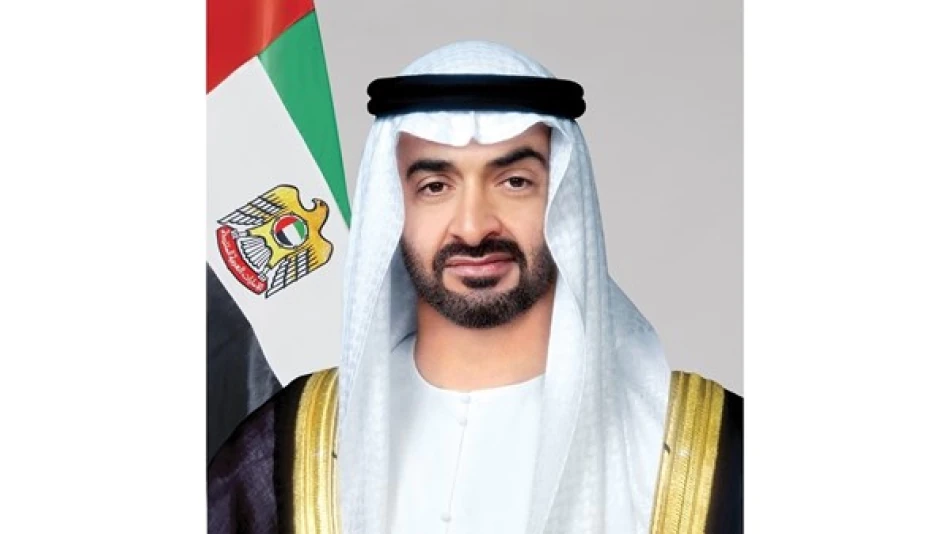
UAE President Establishes National Anti-Narcotics Agency to Combat Drug Abuse
UAE Creates National Anti-Drug Authority as Gulf States Intensify War on Narcotics
The United Arab Emirates has established a dedicated National Anti-Drug Authority under federal decree, signaling the country's commitment to combating the growing regional drug trade that threatens its position as a global business hub. Sheikh Mohammed bin Zayed Al Nahyan appointed Sheikh Zayed bin Hamad bin Hamdan Al Nahyan to lead the new agency, which will coordinate drug enforcement across the federation's seven emirates.
Strategic Response to Regional Drug Trafficking Surge
The timing of this institutional reform reflects mounting pressure on Gulf states from international drug trafficking networks. The UAE's strategic location between Asia, Africa, and Europe has made it an attractive transit point for narcotics, particularly the synthetic stimulant Captagon flowing from Syria and Lebanon toward Saudi Arabia and other Gulf markets.
This centralized approach mirrors successful models in Singapore and Hong Kong, where dedicated anti-narcotics agencies have maintained strict control over drug trafficking despite their roles as major international transit hubs. The UAE's move suggests recognition that fragmented enforcement across multiple agencies may no longer suffice against sophisticated trafficking networks.
Comprehensive Mandate Beyond Traditional Enforcement
Policy and Prevention Focus
The new authority's mandate extends far beyond arrests and seizures. Its responsibilities include developing national drug policies, conducting addiction research, and managing treatment programs for drug users. This holistic approach aligns with modern anti-drug strategies that emphasize public health alongside law enforcement.
Chemical Precursor Controls
Significantly, the authority will regulate chemical precursors used in drug manufacturing—a critical vulnerability that trafficking organizations exploit. This focus on supply chain control could disrupt the production of synthetic drugs like Captagon, which has become a billion-dollar trade across the Middle East.
Medical and Pharmaceutical Oversight
The agency will also oversee medical and pharmaceutical facilities to prevent the diversion of controlled substances. This reflects growing concerns about prescription drug abuse and the illegal sale of medical narcotics, issues that have plagued other developed economies.
Regional Coordination and International Implications
The authority's mandate to coordinate with other countries and international organizations positions the UAE as a regional leader in anti-drug efforts. This could strengthen the country's relationships with Western partners, particularly the United States, which has pressed Gulf allies to do more against drug trafficking.
For international businesses operating in the UAE, the new authority likely means enhanced scrutiny of supply chains and logistics operations. Companies may face stricter compliance requirements, but the long-term benefit could be reduced regulatory risk as the UAE demonstrates its commitment to international anti-drug standards.
Economic Stakes Drive Enforcement Priority
The UAE's economy depends heavily on its reputation as a secure, well-regulated business environment. Drug trafficking poses a direct threat to this image, potentially jeopardizing the country's status as a regional financial center and logistics hub. The creation of a dedicated anti-drug authority represents an investment in protecting these economic advantages.
The appointment of a member of the ruling family to lead the authority underscores the government's seriousness about this initiative. This high-level backing should ensure adequate resources and inter-agency cooperation—factors that often determine the success or failure of such institutional reforms.
As regional drug trafficking networks become more sophisticated and international pressure mounts, the UAE's centralized approach may become a model for other Gulf states grappling with similar challenges. The authority's effectiveness will likely influence broader regional strategies for combating the narcotics trade while maintaining economic openness.
Most Viewed News

 Layla Al Mansoori
Layla Al Mansoori






